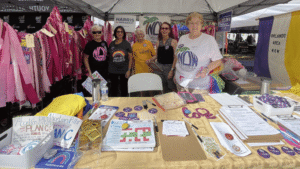 Florida NOW advocates for a broad range of economic justice issues impacting women and gender-expansive people, including living wages, pay equity, protections against job discrimination, social security and pension reform, and more. We aim to challenge and unlearn whitewashed, corporate, and capitalistic feminisms that often overlook or erase the experiences of marginalized, working-class communities and uphold existing systems of oppression.
Florida NOW advocates for a broad range of economic justice issues impacting women and gender-expansive people, including living wages, pay equity, protections against job discrimination, social security and pension reform, and more. We aim to challenge and unlearn whitewashed, corporate, and capitalistic feminisms that often overlook or erase the experiences of marginalized, working-class communities and uphold existing systems of oppression.
Florida NOW is dedicated to dismantling economic barriers that disproportionately impact older women, particularly women of color and disabled elders, who face heightened risks of poverty and economic insecurity. We advocate for equitable access and non-discrimination in pension plans, retirement programs, healthcare, and social security systems—recognizing the intersections of age, race, gender, and ability.
We support public investment in accessible, affordable, and culturally responsive early childhood development and childcare programs that serve families across all economic backgrounds, honoring diverse caregiving needs and structures.
We affirm the essential economic contributions of homemakers and caregivers, advocating for policies that recognize and compensate this labor fairly. We support legal frameworks that reflect marriage and partnerships as equitable economic partnerships, and uplift unpaid and underpaid care work that sustains communities.
We fight for full educational equity for girls and gender-expansive youth, working to eliminate discrimination, segregation, and barriers that disproportionately affect marginalized students. This includes championing inclusive curricula, comprehensive sex education, and anti-racist teaching practices.
We are unequivocal in demanding equitable financial investment in sports, recreation, and extracurricular opportunities for girls and women, recognizing the critical role these spaces play in empowerment and community building.
Florida NOW is committed to challenging and reversing the racialized and gendered nature of poverty, recognizing how systemic racism and sexism compound economic hardship. We call for increased representation of women—especially Black, Indigenous, immigrant, disabled, queer, and trans women—in leadership roles across government, business, education, media, and faith communities to shape policies that reflect our diverse realities.
We believe that teaching Women’s History—and centering the histories of women of color, queer and trans people, and disabled activists—is vital to fostering a just and equitable society.